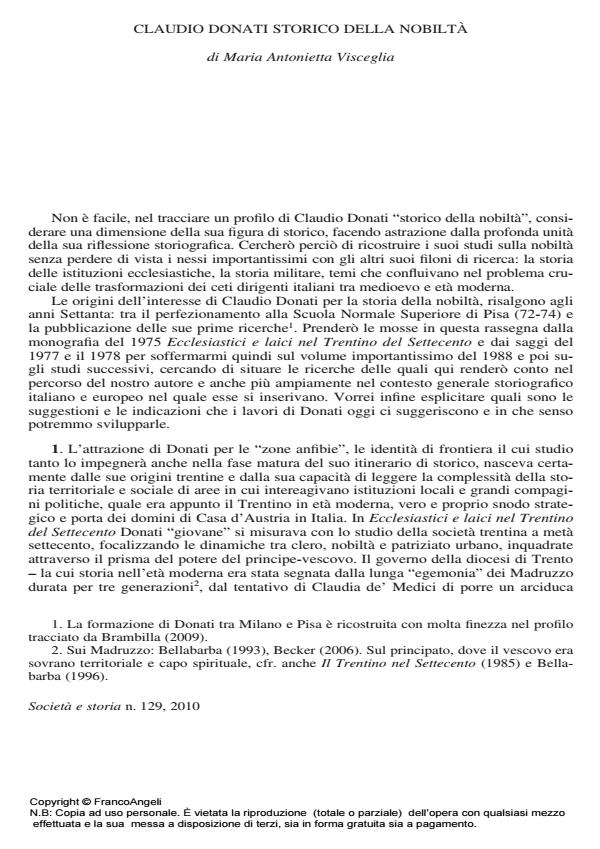Claudio Donati storico della nobiltà
Titolo Rivista SOCIETÀ E STORIA
Autori/Curatori Maria Antonietta Visceglia
Anno di pubblicazione 2010 Fascicolo 2010/129
Lingua Italiano Numero pagine 21 P. 563-583 Dimensione file 707 KB
DOI 10.3280/SS2010-129007
Il DOI è il codice a barre della proprietà intellettuale: per saperne di più
clicca qui
Qui sotto puoi vedere in anteprima la prima pagina di questo articolo.
Se questo articolo ti interessa, lo puoi acquistare (e scaricare in formato pdf) seguendo le facili indicazioni per acquistare il download credit. Acquista Download Credits per scaricare questo Articolo in formato PDF

FrancoAngeli è membro della Publishers International Linking Association, Inc (PILA)associazione indipendente e non profit per facilitare (attraverso i servizi tecnologici implementati da CrossRef.org) l’accesso degli studiosi ai contenuti digitali nelle pubblicazioni professionali e scientifiche
Questo contributo si propone di tracciare un profilo di Claudio Donati storico della nobiltà, gettando luce sulla coerenza del suo percorso di ricerca, esaminando le motivazioni, le letture e gli obiettivi che lo hanno portato ad indagare questo ambito di ricerca. Lo studio delle relazioni tra il potente vescovo-principe di Trento, legato alla corte degli Asburgo, ma eletto dal Capitolo (a sua volta composto da canonici tedeschi e di nazione "italiana"), le élites urbane e la nobiltà feudale fu un’occasione per mettere a fuoco, nel contesto di quella particolare area di confine che fu il Trentino d’antico regime, le relazioni esistenti tra "ecclesiastici e laici" e generò in lui un perdurante interesse per lo studio delle stratificazioni del mondo nobiliare nell’età moderna. All’inizio degli anni settanta Donati intraprese un esteso lavoro di ricerca sui trattati nobiliari, dalle loro origini medievali fino al XVIII secolo, senza trascurare i protagonisti minori di quel dibattito e adottando un approccio rigorosamente comparativo con gli studi di Brunner, Stone, Huppert, Stuart Woolf, Zenobi, Brizzi, Fasano Guarini... Ne è risultato un ricco affresco delle ideologie nobiliari, capace di comprendere la dialettica tra differenti modi di intendere la nobiltà - centrata sulla relazione tra virtù o decadenza - ma anche l’evoluzione dei valori nobiliari che durante l’età dei lumi dovettero venire a patti con altri quali ricchezza, spirito di servizio, appartenenza nazionale. L’idea di nobiltà, pubblicato da Laterza nel 1988, è rimasto una contributo seminale nella storiografia italiana, ma Donati non è rimasto ancorato a quell’approccio: in molti dei suoi successivi studi, tramite nuove incursioni archivistiche, Donati non a mai smesso di problematizzare il composito mondo della nobiltà italiana, ricostruendo il profilo degli attori sociali senza rinunciare a ricondurli alle varie situazioni istituzionali e alle concrete strutture statuali, militari ed ecclesiastiche d’antico regime in cui si trovarono ad agire.
Parole chiave:Storiografia, patriziato, nobiltà, Stato, Chiesa
Maria Antonietta Visceglia, Claudio Donati storico della nobiltà in "SOCIETÀ E STORIA " 129/2010, pp 563-583, DOI: 10.3280/SS2010-129007